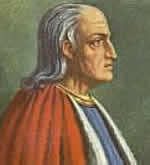 Ideas
Ideas
– God exists, for there is goodness in the world, and goodness an be good only through a supreme good that is good through itself, and only God is good through himself.
– God exists, for since whatever exists does so only through something, there must be a supremely great being that exists though itself and through which all other things exist.
– God exists, for there are degrees of worth in the world, and degrees of worth are understandable only by reference to a being of supreme worth, the highest of all existing beings.
– God necessarily exists, for he is the being than whom none greater can be though, and it is greater for such a being to exist than not to exist than not to exist, and to exist necessarily.
– God freely became a human being because to secure man’s happiness (for which man was created) man had to be punished for his sin and no one but God could make such satisfaction: God became man in order to make the offering necessary for redemption.
Biography
Anselm was an Italian born, Benedictine English philosophical theologian. He is best known for his ontological argument for the existence of God, and the satisfaction theory of the Atonement.
His Monologion and Proslogion both deal extensively with his ontological proofs for God’s existence, and the hierarchical order of the universe.
Major Works of Saint Anselm of Canterbury
– Monologian
– Proslogion
– Cur Deus Homo
Saint Anselm of Canterbury[a] (/ˈænsɛlm/; 1033/4–1109), also called Anselm of Aosta (Italian: Anselmo d’Aosta) after his birthplace and Anselm of Bec (French: Anselme du Bec) after his monastery, was an Italian[7] Benedictine monk, abbot, philosopher and theologian of the Catholic Church, who held the office of Archbishop of Canterbury from 1093 to 1109. After his death, he was canonized as a saint; his feast day is 21 April.
As archbishop, he defended the Church’s interests in England amid the Investiture Controversy. For his resistance to the English kings William II and Henry I, he was exiled twice: once from 1097 to 1100 and then from 1105 to 1107. While in exile, he helped guide the Greek bishops of southern Italy to adopt Roman rites at the Council of Bari. He worked for the primacy of Canterbury over the bishops of York and Wales but, though at his death he appeared to have been successful, Pope Paschal II later reversed himself and restored York’s independence.

 Ideas
Ideas
I think this web site has got some really great info for everyone :D. “Believe those who are seeking the truth doubt those who find it.” by Andre Gide.